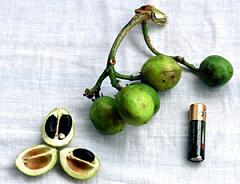 As the debate continues to rage over using some foodstuffs for fuel, there seems to be a plant that could solve the issue. The jatropha plant from Africa has been used for centuries as a natural hedge. Now, it could be a natural substitute for plants such as soybeans in the search for feedstocks for biodiesel.
As the debate continues to rage over using some foodstuffs for fuel, there seems to be a plant that could solve the issue. The jatropha plant from Africa has been used for centuries as a natural hedge. Now, it could be a natural substitute for plants such as soybeans in the search for feedstocks for biodiesel.
This story on CNNMoney.com says BP has a $160-million deal with British biodiesel producer Dl Oils to become the world’s largest producer of jatropha oil by 2011. Company officials hope to have nearly three million acres under cultivation within the next four years. That will put out about two million tons annually… the equivilant of nearly 20 percent of Europe’s forecatsed biodiesel demand:
“The deal with Dl is all about developing a biofuels business,” says BP spokeswoman Wendy Silcock. Half of the 12 countries targeted for bulk plantings are in Africa.
Because it can grow year-round in arid soil and is inedible, jatropha won’t innate food prices or take up valuable cropland. Africa is considered ideal because of its proximity to European markets and low land and labor costs. “Jatropha is low input,” says Steve Douty, executive director of Dl Oils. “It survives where others don’t. It also grows best 25 degrees south or north of the equator. A big chunk of Africa is in that band.”
The article goes on to say that the plant is good for African farmers because it grows well in poor soils, comes to maturity faster than other biodiesel feedstocks such as palm oil, and doubles as a natural fence for their livestock. It’s already popular as a source for biodiesel in other areas such as India and China, as well as the builder of a 320-million-gallon-a-year biodiesel along the Chesapeake Bay in Virginia. In addition, researchers at the University of Florida are looking at growing the plant here in the U.S. (see my post on August 31st).

